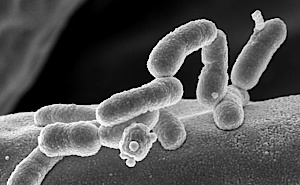Microbial Communication

In their natural habitats, microorganisms live in permanent exchange with their environment and the surrounding microbes and higher organisms. The nature of these interactions ranges from peaceful symbioses to competition for nutrients and even pathogens infecting hosts. Interactions arising from them are controlled by different chemical signals. Often, small molecules produced by the microorganisms serve as mediators of communication. These low molecular weight substances can serve as attractants, repellents or as virulence factors. Elucidation of microbial communication and of the underlying molecular and biochemical processes is of fundamental importance, for example for the understanding of agriculturally relevant ecosystems in the soil, of host-pathogen interactions during infectious diseases and for the identification of novel pharmaceutically active substances.
Contact
Dr. Michael Ramm
Research Coordinator
Leibniz Institute for Natural Product Research and Infection Biology - Hans-Knoell-Institute (HKI)
Phone: +49-3641-532 1011
Email: michael.ramm(at)leibniz-hki.de
Prof. Dr. Axel Brakhage
Leibniz Institute for Natural Product Research and Infection Biology – Hans-Knöll-Institute (HKI)
Prof. Dr. Erika Kothe
Institute of Microbiology, Friedrich Schiller University Jena
Prof. Dr. Wilhelm Boland
Max Planck Institute for Chemical Ecology
Universities and Institutes
- Leibniz Institute for Natural Product Research and Infection Biology - Hans-Knoell-Institute (HKI)
- Max Planck Institute for Chemical Ecology
- Jena University Hospital
- Friedrich Schiller University Jena (FSU)
- Research Profile "Life" at the Friedrich Schiller University Jena (German only)
- Institute for Microbial Communication, Chair for Microbial Communication at the FSU
- Chair for Applied and Ecological Microbiology at the FSU
Centers and Networks
- Jena School for Microbial Communication - JSMC
- International Leibniz Research School for Microbial and Biomolecular Interactions - ILRS
- International Max Planck Research School for Exploration of Ecological Interactions with Molecular and Chemical Techniques - IMPRS
- Collaborative Research Center/Transregio 124: Pathogenic Fungi and their Human Host: Networks of Interaction - FungiNet
- Collaborative Research Center ChemBioSys
- Collaborative Research Center 1076 AquaDiva
- InfectControl 2020 –New anti-infection strategy - Science • Society • Economy (German only)
- National Reference Center for Invasive Fungi Infections - NRZMyk (German only)
- Jena Microbial Resource Collection - JMRC
- German Centre for Integrative Biodiversity Research (iDiv) Halle-Jena-Leipzig
- Research Training Group 1257 "Alteration and element mobility at the microbe-mineral interface"






